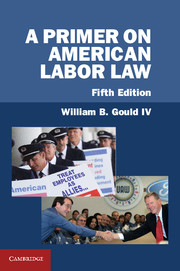Book contents
- Frontmatter
- Contents
- Preface to the Fifth Edition
- Preface to the Fourth Edition
- Preface to the Third Edition
- Preface to the Second Edition
- Preface to the First Edition
- 1 An Overview
- 2 Industrial Relations and Labor Law before Modern Legislation
- 3 The National Labor Relations Act and Related Labor Law
- 4 Unfair Labor Practices
- 5 Establishing the Collective Bargaining Relationship: Organization and Recognition
- 6 Economic Pressure and Bargaining Tactics in the Established Relationship
- 7 Remedies, the Labor Reform Bill of 1978, and the Employee Free Choice Bill of 2009
- 8 Dispute Resolution in the Established Relationship
- 9 The Duty of Fair Representation
- 10 The Public Sector
- 11 Public-Interest Labor Law
- 12 Conclusion
- Index
- References
4 - Unfair Labor Practices
Published online by Cambridge University Press: 05 June 2013
- Frontmatter
- Contents
- Preface to the Fifth Edition
- Preface to the Fourth Edition
- Preface to the Third Edition
- Preface to the Second Edition
- Preface to the First Edition
- 1 An Overview
- 2 Industrial Relations and Labor Law before Modern Legislation
- 3 The National Labor Relations Act and Related Labor Law
- 4 Unfair Labor Practices
- 5 Establishing the Collective Bargaining Relationship: Organization and Recognition
- 6 Economic Pressure and Bargaining Tactics in the Established Relationship
- 7 Remedies, the Labor Reform Bill of 1978, and the Employee Free Choice Bill of 2009
- 8 Dispute Resolution in the Established Relationship
- 9 The Duty of Fair Representation
- 10 The Public Sector
- 11 Public-Interest Labor Law
- 12 Conclusion
- Index
- References
Summary
As we saw in Chapter 3, neither the members of the National Labor Relations Board, nor the judicial side of the Board, nor the courts can adjudicate unfair labor practices unless the NLRB General Counsel determines that a complaint should be issued. But labor law decisions are made almost every working day of the year in unfair labor practice proceedings (and, to a lesser extent, in representation elections). Some of these decisions are very important and precedent setting.
What are “unfair labor practices”? As noted earlier, both employers and labor organizations may engage in such practices. Employers’ unfair labor practices were written into the law in 1935 and have remained unchanged. An employer is prohibited from interfering with, restraining, or coercing employees in any way in connection with their right to engage in concerted activities, to protest working conditions, and to join labor organizations for the purpose of collective bargaining (or to refrain from any of these things). The union may not restrain or coerce workers in the exercise of their rights protected under the statute (the language here is slightly less ambitious than that applied to employers). Surveillance of union activities, use of union “spies,” interrogation of employees about union activities, threatening employees for being involved in the union, and promising benefits if employees desist from union activity are among the prohibited employer actions. Indeed in 1980 the NLRB held that an employer may not lawfully “initiate questioning about employees’ union sentiments even where the employees are open and known union supporters and the inquiries are unaccompanied by threats or promises.” However, in 1984 the Board, characterizing its earlier position as a per se condemnation of interrogation inconsistent with Board precedent, held that such an approach “ignored the reality of the workplace” and that interrogations could be viewed as unlawful only with reference to “all of the circumstances.”
- Type
- Chapter
- Information
- A Primer on American Labor Law , pp. 77 - 106Publisher: Cambridge University PressPrint publication year: 2013



